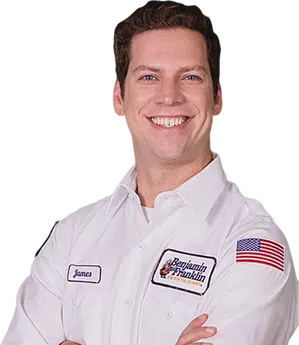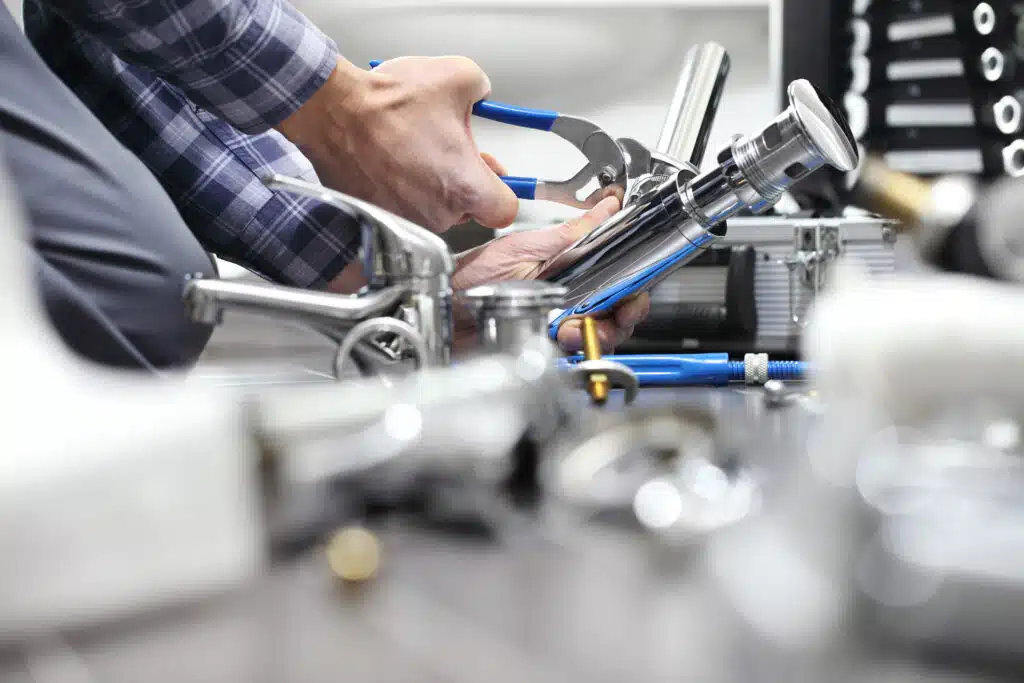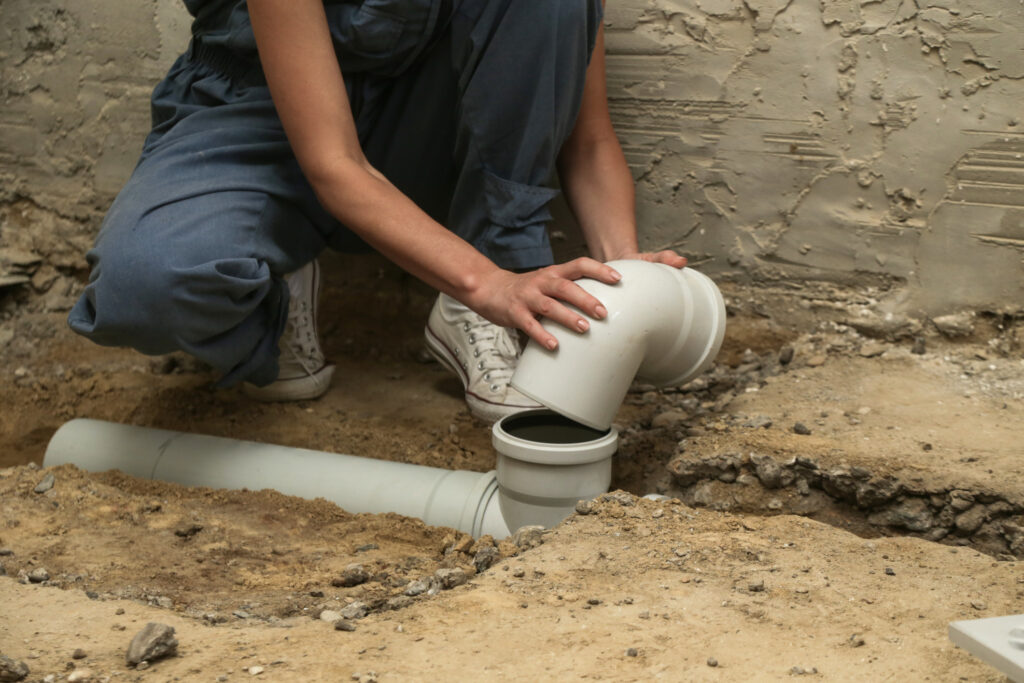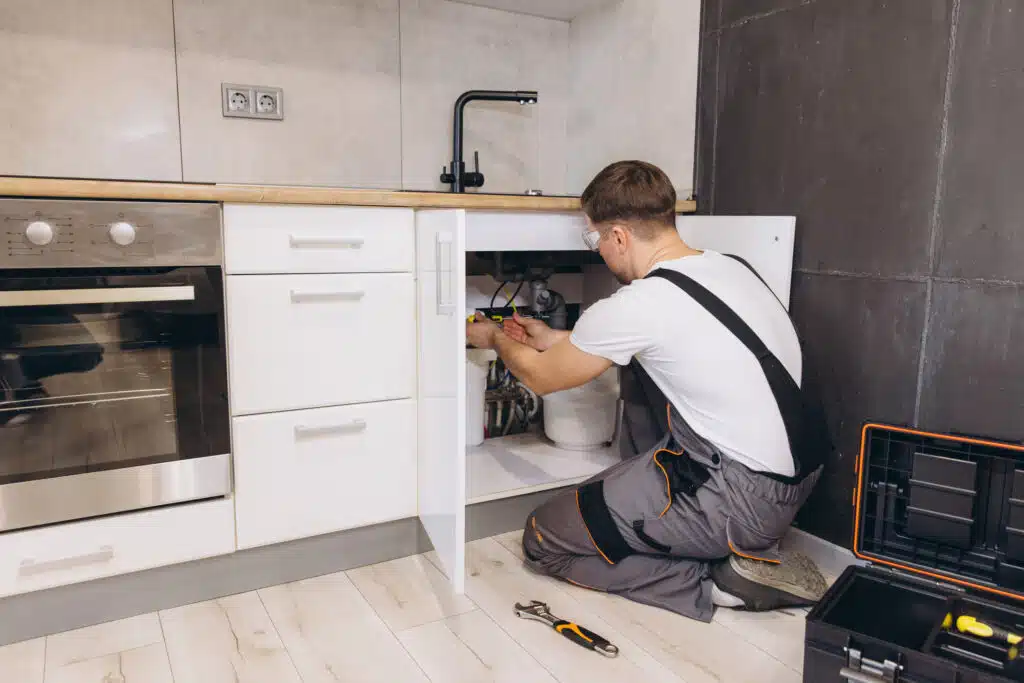Tankless water heaters offer a constant supply of hot water by heating it on demand, eliminating the need for a bulky storage tank. They save space, are energy-efficient, and reduce utility costs by only heating water when you need it. Ideal for homes of any size, tankless systems ensure you never run out of hot water, making them a smart upgrade over traditional heaters. With a longer lifespan and environmental benefits, switching to a tankless water heater is a worthwhile investment for continuous hot water and lower bills.
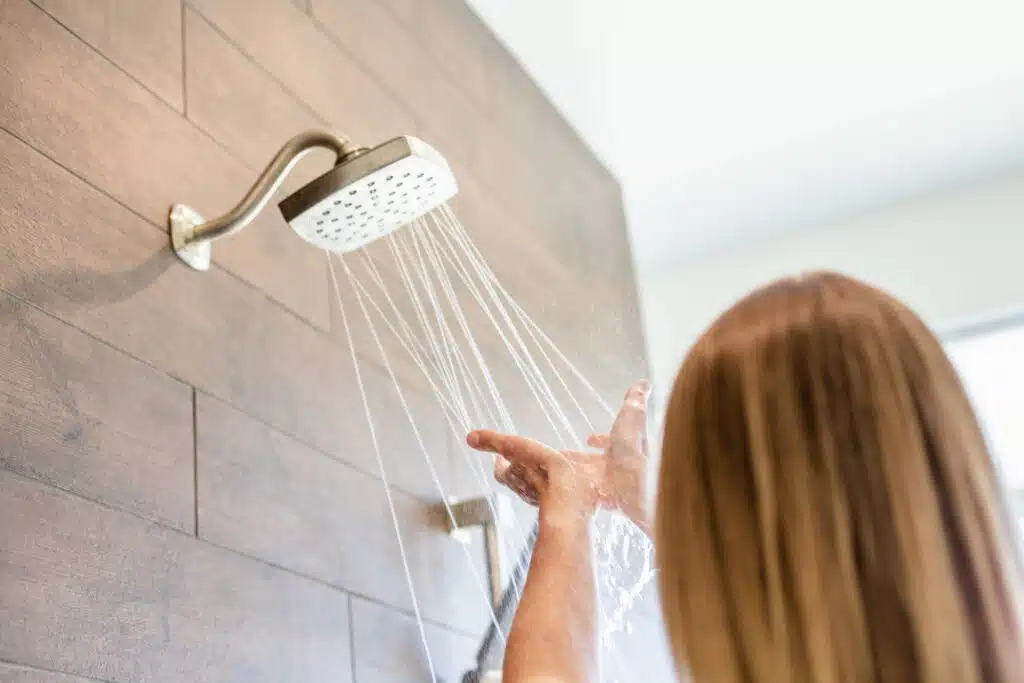
Tired of running out of hot water when you need it the most? Tankless water heaters could be the game-changer for your home! These innovative systems heat water on demand, eliminating the wait and the hassle of bulky tanks.
Not only do they save space, but they also boost energy efficiency, helping you cut down on utility costs. Whether you’re thinking about upgrading or just exploring your options, let’s explore everything you need to know about tankless water heaters!
How Do Tankless Water Heaters Work?
Tankless water heaters heat water directly without the use of a storage tank, providing hot water on demand. When you turn on the hot water tap, cold water travels through a pipe into the unit where it is heated by either an electric element or a gas burner.
This process allows for a continuous supply of hot water as long as the tap is open. The efficiency of tankless systems comes from their ability to heat water only when needed, reducing energy consumption and utility costs.
Types of Tankless Water Heaters
There are two main types of tankless water heaters: electric and gas-powered. Each type has unique features and benefits, catering to different needs and household setups.
Choosing the right type depends on factors like your home’s energy source, hot water demand, and installation preferences. Understanding these differences can help you select the best option for your home.
Electric Tankless Water Heaters
Electric tankless water heaters use electricity to heat water as it passes through the unit, making them compact and easy to install. They are typically less expensive upfront and do not produce emissions, making them an environmentally friendly choice.
However, they may have lower flow rates and might require electrical upgrades, especially in homes with high hot water demands. They are best suited for smaller homes or specific applications like individual bathrooms.
Gas Tankless Water Heaters
Gas tankless water heaters use natural gas or propane to heat water and generally offer higher flow rates, making them suitable for larger households. They can handle multiple hot water demands simultaneously, providing a more consistent supply.
However, gas models require proper ventilation and access to a gas line, which can increase installation costs. Despite the higher initial expense, they often prove more cost-effective over time due to lower operating costs.
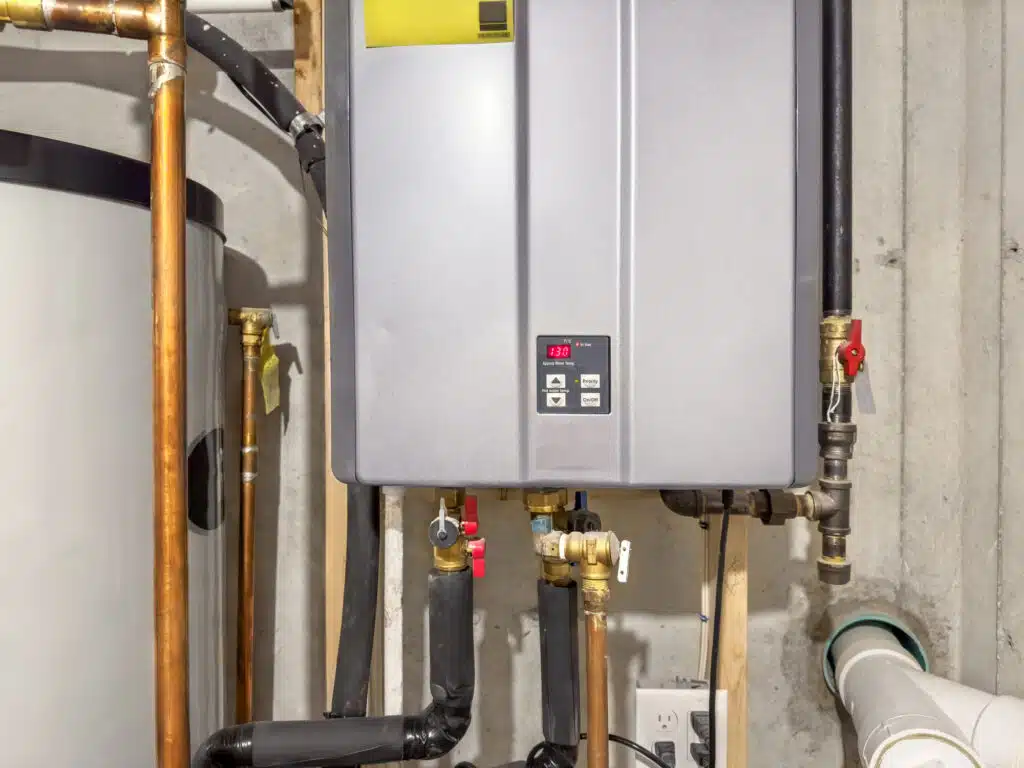
Main Advantages of Upgrading to On-Demand Water Heating
Switching to an on-demand water heating system comes with several benefits that make it a popular choice for many homeowners. First, it provides an endless supply of hot water, so you won’t have to worry about running out during a long shower.
These systems are also highly energy-efficient since they only heat water when you need it, reducing overall energy usage and costs. Additionally, their compact size frees up space in your home, unlike traditional bulky tank heaters.
Finally, these systems tend to have a longer lifespan, offering more value over time compared to conventional models.
Endless Hot Water Supply
One of the best perks of on-demand systems is the continuous flow of hot water they provide. Unlike traditional heaters that can run out of hot water after a while, these units heat water as it flows through, ensuring a constant supply.
This is especially useful for larger families or homes with high hot water demands, like back-to-back showers or running multiple appliances at once. You’ll never have to schedule showers around when the water might turn cold again.
Energy Efficiency
On-demand water heaters are known for their energy efficiency because they only heat water when it’s needed, rather than maintaining a large tank of hot water around the clock.
This on-demand heating can save a significant amount on energy bills, especially in homes that use a lot of hot water. They typically use less energy overall, which is good for the environment and your wallet. Over time, the savings on utility bills can make up for the higher upfront cost of these systems.
Space-Saving Design
Another advantage of on-demand heating is the compact and space-saving design. Traditional water heaters with large tanks take up a lot of space, which can be a hassle in smaller homes or apartments.
On-demand models are much smaller and can be mounted on walls or installed in tight spaces. This frees up valuable room in your home, making it easier to organize or use the space for other purposes.
Longer Lifespan
On-demand units typically last longer than traditional tank water heaters, often providing reliable service for 20 years or more. Traditional water heaters with tanks usually need to be replaced every 10-15 years, making on-demand models a better long-term investment.
The longer lifespan is due to their efficient design and fewer components exposed to water, which reduces the risk of rust and corrosion. This means less frequent replacements and more years of hassle-free hot water.
Lower Utility Bills
Since on-demand systems heat water only when needed, they use less energy overall compared to traditional water heaters. This increased efficiency can lead to noticeably lower utility bills, especially if your household uses a lot of hot water.
Over time, the savings on your energy costs can add up, helping to offset the initial investment. It’s a smart choice for those looking to save money while also reducing their environmental footprint.
Environmental Benefits of Tankless Water Heaters
Switching to an on-demand water heating system isn’t just good for your home and wallet—it’s also a smart choice for the environment. By using less energy, these systems help reduce your carbon footprint, making your home more eco-friendly.
They also contribute to less material waste over time, as their longer lifespan means fewer units end up in landfills compared to traditional water heaters. Let’s explore the key environmental benefits of making the switch.
Reduced Carbon Footprint
These systems are more energy-efficient because they heat water only when you need it, unlike traditional heaters that continuously keep a large tank of water hot.
This on-demand heating reduces overall energy consumption, which in turn lowers greenhouse gas emissions associated with electricity or gas usage.
By reducing your home’s energy demand, you’re playing a part in cutting down on carbon emissions, making these systems a greener choice.
Less Material Waste
Traditional water heaters with tanks typically need replacing every 10-15 years, leading to more frequent waste. In contrast, on-demand units can last 20 years or more with proper maintenance, meaning fewer replacements over the same period.
This not only reduces the amount of metal and other materials that end up in landfills but also minimizes the resources and energy needed to manufacture new units. By opting for a tankless system, you’re contributing to a reduction in overall material waste.
Common Myths About Tankless Water Heaters
There are several myths floating around about tankless water heaters that can make people hesitant to switch. Some believe that tankless heaters can’t provide enough hot water, are too expensive to install, or that maintaining them is a hassle.
These misconceptions can often overshadow the many benefits that tankless systems offer. Let’s bust some of these myths and set the record straight about what tankless water heaters can really do.
They Don’t Provide Enough Hot Water
A common myth is that tankless water heaters can’t keep up with the demand for hot water, especially in larger households. In reality, tankless heaters are designed to provide a continuous supply of hot water, as long as you have the right size unit for your needs.
While it’s true that there are limits to how many fixtures can run simultaneously, choosing a properly sized unit or installing multiple units can easily meet the demands of any home.
They Are Too Expensive to Install
Many people think tankless water heaters are too pricey upfront, especially when compared to traditional models. While the initial cost can be higher, it’s important to consider the long-term savings on energy bills and the longer lifespan of tankless systems.
Over time, the efficiency of a tankless water heater often offsets the initial installation cost, making it a cost-effective choice in the long run. Plus, there are often rebates or incentives available that can help reduce the upfront expense.
Maintenance is Complicated
Another myth is that tankless water heaters are difficult to maintain, but this isn’t the case. Basic maintenance for a tankless water heater is straightforward and mainly involves descaling to prevent mineral buildup, which is especially important in areas with hard water.
Most units have alerts or indicators that let you know when maintenance is needed. Regular cleaning and occasional servicing by a professional can keep your tankless heater running smoothly without much hassle.
Factors to Consider Before Installing a Tankless Water Heater
Before deciding to install a tankless system, there are a few important factors to keep in mind. The size of your home, your household’s hot water needs, and the installation location all play a significant role in choosing the right unit.
Evaluating these aspects will help ensure that the system is a good fit for your home and will deliver the performance you expect.
Home Size and Hot Water Demand
The size of your home and the number of occupants will influence your overall demand for hot water. Larger homes with multiple bathrooms or high water usage may need a more powerful unit or even multiple systems to maintain a steady hot water supply.
It’s crucial to match the unit’s capacity to your peak usage times, like during morning showers or when multiple appliances are in use.
Installation Location
Choosing the right installation location is also key. The unit needs to be installed in an area that’s accessible for maintenance but also protected from extreme conditions. Gas models require proper ventilation, so placing them near an exterior wall is ideal.
Electric units might need an electrical upgrade to handle the increased power demand. Proper placement ensures optimal performance and longevity of the system.
Installation Process for Tankless Water Heaters
Installing a tankless system can be a game-changer for your home, but the installation process itself can vary depending on the type of unit and your home’s setup.
It’s important to decide whether to tackle the installation on your own or hire a professional. Knowing what to expect during the installation can help you make the best choice for your situation.
Professional vs. DIY Installation
Deciding whether to install your system yourself or hire a professional can be a tough choice, but it’s important to weigh the pros and cons carefully.
- Confidence vs. Expertise: Some homeowners may feel confident in doing the installation themselves, but hiring a professional is often the safer choice.
- Correct and Safe Setup: Professionals ensure the unit is installed correctly, safely, and in line with local codes and regulations.
- Gas Units Need Special Attention: This is especially crucial for gas units that require proper venting and secure gas line connections.
- Cost vs. Risk: While DIY might save on initial costs, professional installation minimizes the risk of costly mistakes and future issues.
Ultimately, choosing a professional installation can save you time, provide peace of mind, and ensure that your system operates safely and efficiently from day one.
What to Expect During Installation
During installation, a professional will start by choosing the best location for the unit, considering factors like accessibility and ventilation. Next, they’ll handle any necessary upgrades, such as electrical work for electric models or venting for gas models.
The actual setup involves connecting the system to your water supply and power source, followed by thorough testing to ensure everything is working correctly.
The process typically takes a few hours, and once completed, you’ll be ready to enjoy the benefits of on-demand hot water.
Basic Maintenance Tips for Tankless Water Heaters
Keeping your tankless unit in top condition is essential for optimal performance and longevity. Fortunately, these systems are generally low maintenance, requiring just a few simple steps to ensure they run efficiently.
Regular upkeep helps maintain a consistent supply of hot water and can prevent unexpected breakdowns or costly repairs. By following some basic maintenance tips, you can keep your unit functioning at its best for years to come.
Regular Descaling
Descaling is a crucial maintenance task, particularly in areas with hard water, which can cause mineral buildup inside the unit. Over time, this buildup can reduce the efficiency of the heating elements and even cause damage if not addressed.
It’s recommended to descale your tankless system at least once a year, but this can vary depending on your water quality. Many units come with indicators or alerts that notify you when it’s time for descaling, making it easier to stay on top of this important task.
Cleaning or Replacing Filters
Filters play an important role in protecting your system from sediment and debris that can enter the water supply. Over time, these filters can become clogged, which can lead to reduced water flow and decreased heating efficiency.
It’s important to check the filters regularly, typically every few months, and clean or replace them as needed. By keeping the filters clean, you ensure that your tankless unit operates smoothly and efficiently, providing reliable hot water whenever you need it.
Ready to Upgrade to Endless Hot Water?
Don’t settle for cold showers and high energy bills! At Benjamin Franklin Plumbing of Lancaster, we specialize in installing high-quality tankless water heaters tailored to your home’s needs in Lancaster, Lebanon, Reading, and surrounding areas.
Our experts are ready to help you make the switch to a more efficient, reliable hot water solution. Contact us today to schedule a consultation and experience the benefits of on-demand hot water!
Tankless Water Heaters FAQs
How long do tankless water heaters last?
Tankless water heaters usually last about 20 years or more, which is longer than traditional tank models that often need replacing every 10-15 years. Regular maintenance like descaling and filter cleaning can help extend their lifespan even further.
Can a tankless water heater run out of hot water?
Tankless systems provide continuous hot water since they heat water on demand, so you won’t run out as long as the unit is appropriately sized. If multiple high-demand appliances run simultaneously, the system might struggle to keep up. Upgrading to a more powerful unit or installing an additional system can help resolve this.
Are tankless water heaters worth the investment?
While the initial cost is higher than traditional models, the energy efficiency and longer lifespan of tankless units make them a smart investment. Over time, savings on utility bills and fewer replacements can offset the upfront expense. The endless supply of hot water and compact design also add value and convenience.
Do tankless water heaters work in cold climates?
Yes, tankless systems can work effectively in cold climates if the unit is designed for such conditions. Cold incoming water needs more energy to heat, so choosing a unit with sufficient capacity is crucial. Some models are specifically made for colder temperatures and perform well even with icy water supplies.
How much maintenance do tankless water heaters require?
These units are generally low maintenance but do need regular upkeep like descaling and filter cleaning, typically once a year. Staying on top of these tasks helps maintain efficiency and extends the unit’s lifespan. Proper maintenance ensures a reliable hot water supply with minimal hassle.

